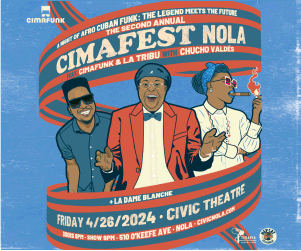We move pretty slowly here in New Orleans. I almost said “Big Easy” but I truly abhor those two words to describe the city. It’s like offhandedly telling a joke, one that you didn’t think was offensive, but after giving it some thought, you realize that it perpetuates an abominable stereotype, and you shouldn’t have told it.
That’s sort of the way I feel about calling New Orleans “The Big Easy.”
There’s a lot of irony, I think, in using this name for New Orleans. I’ve really never known the origin of the moniker—I always thought it might be a term that some tourism official came up with to promote the city as the antithesis of New York (“The Big Apple”). Things aren’t so easy here. Slow—especially in the summer—but easy?
The “Big Easy” I’m most familiar with was the name of the roundly-ridiculed (at least in New Orleans) 1987 movie featuring Dennis Quaid and Ellen Barkin.
I’ve read other origins of the term. Some people opine that “The Big Easy” title is ironically derived from a 1970 crime novel by James Conaway, who worked for the Times-Picayune as a reporter in the mid-1960s. The Kirkus review describes it thusly:
“Horror, tragedy, crushing violence and the effluvia of sin and guilt sluice this murky chronicle of race embroilment in New Orleans. Onlooker, accidental mover and victim is white newsman Andrew Comiski, who had been friendly with the deceased black Parks, a likable and discreet racketeer who had escaped the trigger-happy police. On the trail of the grave robbers who had decapitated Parks’ corpse, Comiski is propelled into the vortex of drug, track and gun-running operations through which a white motorcycle killer gang, a black militant, Tea, his stable of followers, Tea’s wife Carrie, and spooked police elude and stalk one another. In a blur of pain and fear–he is shot at, clubbed, bruised and mashed by just about everyone–Comiski survives a race riot in which Tea is killed. But his attempt to clear Carrie and thwart hoods and brutal police by dumping narcotics ends in his death. Carrie, after uncovering the Parks’ “artifact” among Tea’s possessions, stunned by Tea’s note that she doesn’t “exist” (she had slept with Comiski) groggily buses north. A certain raw impetus but the accelerated, insistent bloodletting drains the real compassion and concern.”

Whoa. I wouldn’t call any of that easy. In an interview with New Orleans Magazine in 2007, Conaway says he picked the title from hearing a couple of guys talking about how easy it was to get a music gig in New Orleans, and the phrase stuck in his head. Yeah, we always knew that it’s the music that makes things “easy” here. Ask any musician how easy it is to live here.
Treme’s co-creator and author David Simon wrote his first book about his experiences at the Baltimore Sun when he covered the crime beat there from 1982 to 1995. Simon was embedded in the Baltimore Police Department homicide unit. It was called Homicide: A Year on the Killing Streets.
Unfortunately, that’s exactly what’s been occurring in New Orleans. It’s summer, and the crime rate here usually rises with the temperature. I woke up to read this morning’s paper where it was reported that two people had been shot to death and three more wounded while attending a birthday party yesterday afternoon. The shooting took place about 10 blocks from my house. Thugs killing innocent victims at a birthday party: a 5-year-old girl and a 33-year-old woman died from gunshot wounds; a 10-year-old boy was grazed by bullet wounds to the face and leg. Two other men in their 20s were also wounded. And, as I write this, I’m reading about a brazen shooting by two would-be robbers (aged 13 and 15) that killed a Mid-City man, who was sitting on his front porch. 13 and 15 years old. How tragic is that?
Yeah, this is the “Big Easy” all right: easy to get a gun, easy to use a gun. Easy to walk away from victims you don’t give a damn about. There’s absolutely no “easy” fix to this. My first inclination (and a pipe-dream, to be sure, considering the country’s continual brainwashing by one of Washington’s slickest and most affluent lobbying organizations, the NRA) would be to make it impossible for anyone to get a gun in New Orleans. No one can own a gun, or have access to a handgun or an assault weapon. While this would not solve the problem, at least it would keep young soulless morons from killing each other, and innocent victims and bystanders. Before the gun folk start screaming: please check your statistics about the people who are killed or injured by guns in a crime situation in the US. Owning a gun is not going to prevent you from being attacked by a 20-year-old soulless thug in a surprise situation. And if you do own a gun, how much of a chance to you really think you have of protecting yourself from these zombies? Do you really want to carry a gun at all times to protect yourself? What kind of paranoia is this?
I am very aware that this is simplistic, and the factors that contribute to our escalating murder rate are a lot more complex and interrelated: poor education, lack of jobs, lack of hope, lack of love and concern and moral training from parental figures for these kids who are doing the killing. Of course, we need more police. Of course, we need better cooperation from witnesses. Naturally we need more convictions from the judicial system. But this is putting a band-aid on the problem. As long as it’s easy to obtain a gun to rob, kill and maim, murdering someone else will also be easy, very easy.




